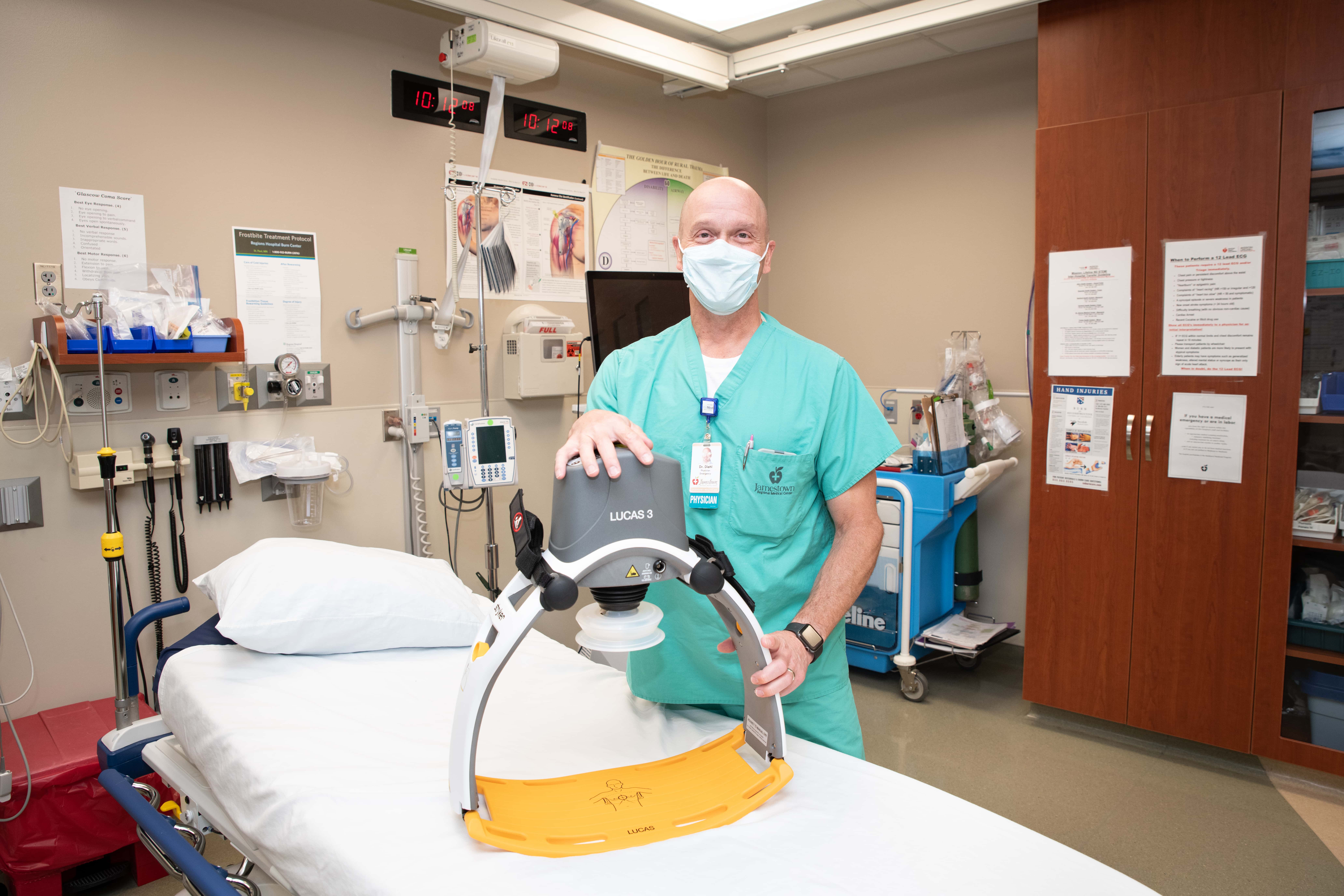
JRMC Emergency Physician Dr. Kent Diehl with the LUCAS device. Photo: JRMC
By Ally Knudtson
JAMESTOWN, N.D. (JRMC) – A new mechanical CPR device will help reduce the spread of the novel coronavirus (COVID-19) in this region.
Jamestown Regional Medical Center received a LUCAS mechanical chest compression device to work alongside the hospital’s existing LUCAS device. This is thanks to a gift from the Leona M. and Harry B. Helmsley Charitable Trust.
A LUCAS device automatically performs CPR on a patient. In emergent situations with COVID-19 patients, using the LUCAS instead of traditional CPR means one less healthcare worker is potentially exposed to the virus.
“We don’t want frontline healthcare workers to choose between saving a patient or risking coronavirus exposure to themselves and others,” said Walter Panzirer, a trustee for the Helmsley Charitable Trust. “LUCAS is a proven and effective tool in saving lives during cardiac arrest. Having more of them available during this pandemic will save even more lives, including those of the doctors, nurses and other healthcare workers.”
As many as one in five COVID-19 patients show symptoms of cardiac damage, leading to heart failure and death even among those who show no signs of respiratory distress. The rise in cardiac complications caused by COVID-19 exposes both patients and healthcare workers to greater risk, as hands-on CPR can be needed for extended periods and personal protective equipment can become less effective in keeping the virus from spreading to medical providers.
Deploying LUCAS devices is part of a multimillion-dollar effort made by The Helmsley Charitable Trust to save the lives of COVID-19 patients and protect the frontline healthcare workers caring for them.
“This is huge. The LUCAS eliminates risks related to COVID-19. This means we need one less healthcare worker to directly administer CPR. It means one less person is potentially exposed,” said Sheila Krapp, JRMC Emergency Department manager.
Support from the community and foundations like Helmsley give patients and teams additional protection, said Lisa Jackson, JRMC Foundation Director.
“We are so grateful for this partnership with the Helmsley Charitable Trust. It understands the needs of our frontline teams,” Jackson said.
Mechanical CPR’s benefits
Emergency medical responders and hospitals around the globe adopted mechanical CPR because of its ability to deliver extended CPR in compliance with American Heart Association guidelines.
Multiple studies have demonstrated equivalence to high-performance CPR, as well as increased provider safety and higher rates of adequate compressions for patients in transport situations. The Department of Defense COVID-19 Practice Management Guide identified the LUCAS chest compression system as the best practice for managing patients in cardiac arrest to reduce the risk of exposure to care providers.
The Helmsley Charitable Trust is partnering with medical facilities in South Dakota, North Dakota, Montana, Wyoming and Nebraska to ensure the devices are in place before the peak of COVID-19 hits. The devices will remain in place after the pandemic as part of the hospitals’ cardiac system of care.
“We were able to go from concept to delivery of the devices in two weeks, and that’s been an incredible effort of teamwork with the manufacturer and the hospitals to get them in place ahead of the peak needs,” Panzirer said. “It’s wonderful to see competing entities working together during a national crisis for the good of all.”
To learn how to support frontline workers at JRMC, visit www.jrmcnd.com/giving.
